On Tuesday, I received a book entitled “Accelerating Learning for All Students” in which all of the teachers in the district will receive professional development in the upcoming week. I cannot speak to the ELA piece of the material, however the math examples made me cringe. I quickly got out my post-its and started reading…pink for positives, yellows for yuck.
 I think various points of the book were positive as far as the focus on teacher planning and opening up tasks to be accessible to all learners, they even have Carol Dweck’s Mindset mentioned, however the pathways they explain to achieve this accessibility completely frustrated me. To me, it feels completely at odds with all of the great math work we have been doing in our district/state. I am sure so many of you can relate to the type of aggravation that builds from being so passionate about learning. This week, I have been very aggravated.
I think various points of the book were positive as far as the focus on teacher planning and opening up tasks to be accessible to all learners, they even have Carol Dweck’s Mindset mentioned, however the pathways they explain to achieve this accessibility completely frustrated me. To me, it feels completely at odds with all of the great math work we have been doing in our district/state. I am sure so many of you can relate to the type of aggravation that builds from being so passionate about learning. This week, I have been very aggravated.
Thank goodness for Twitter.
From this point on, I cannot take credit for this blog post…I had some incredible help…
It all started when Frank threw out this tweet yesterday afternoon: Wow, was he reading the same book I was, with mnemonics and other “tricks” to help students “learn” multiplication? I responded with a pic from my book, along the same lines:
Wow, was he reading the same book I was, with mnemonics and other “tricks” to help students “learn” multiplication? I responded with a pic from my book, along the same lines:
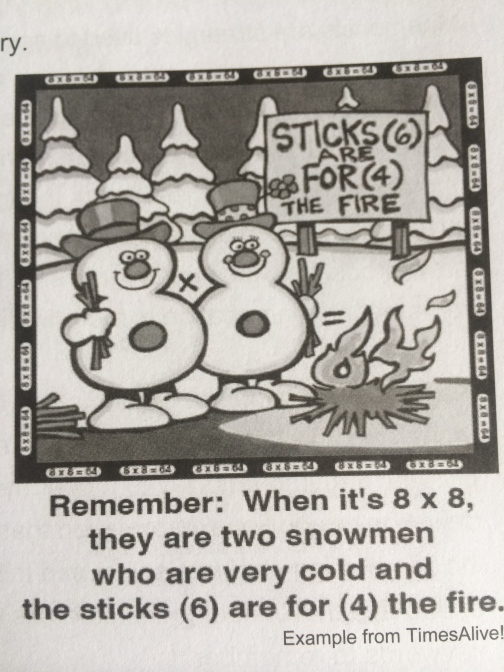 Of course the ever obvious question…
Of course the ever obvious question…
 Which was quickly followed by…
Which was quickly followed by…
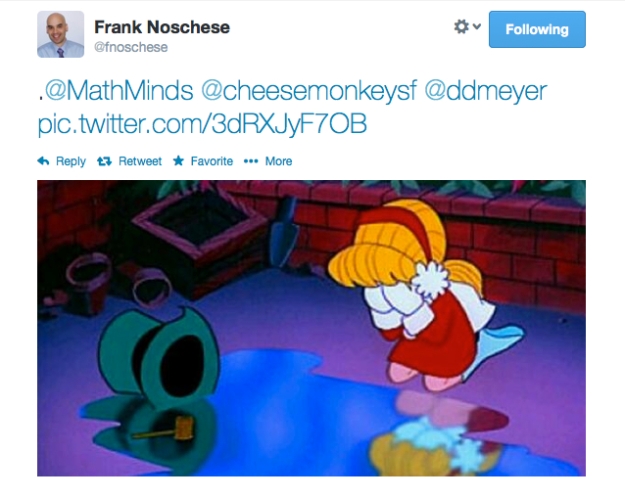 Then Dan offers this suggestion….
Then Dan offers this suggestion….
 And now, for your entertainment, a few of the worst mnemonics and memorization tactics for multiplication (feel free to add any others in the comments:)…
And now, for your entertainment, a few of the worst mnemonics and memorization tactics for multiplication (feel free to add any others in the comments:)…

 (Thanks David for the hashtag inspiration)
(Thanks David for the hashtag inspiration)
What could make this even better….
 So as not to disappoint….
So as not to disappoint….
 But the good news is kiddos…..
But the good news is kiddos…..
 And mirroring my own thoughts after reading all of these…
And mirroring my own thoughts after reading all of these…
 I would love to sincerely thank everyone who contributed to this conversation, I needed the laugh. Because, while we all know how absurd this is in the math classroom, it sadly leaks its way in with district/state initiatives. Those leaks are most frustrating for me when they are avoidable. I am SO fortunate to be surrounded by such passionate and knowledgeable math educators I can run to for support, opinions, advice, research, and, in this case, a much needed laugh!
I would love to sincerely thank everyone who contributed to this conversation, I needed the laugh. Because, while we all know how absurd this is in the math classroom, it sadly leaks its way in with district/state initiatives. Those leaks are most frustrating for me when they are avoidable. I am SO fortunate to be surrounded by such passionate and knowledgeable math educators I can run to for support, opinions, advice, research, and, in this case, a much needed laugh!
Thank you!
Kristin








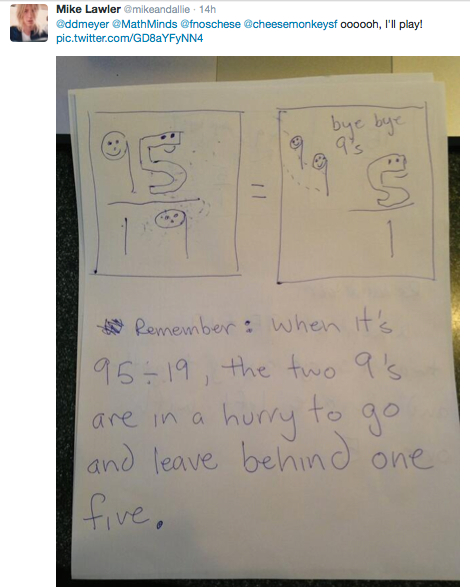
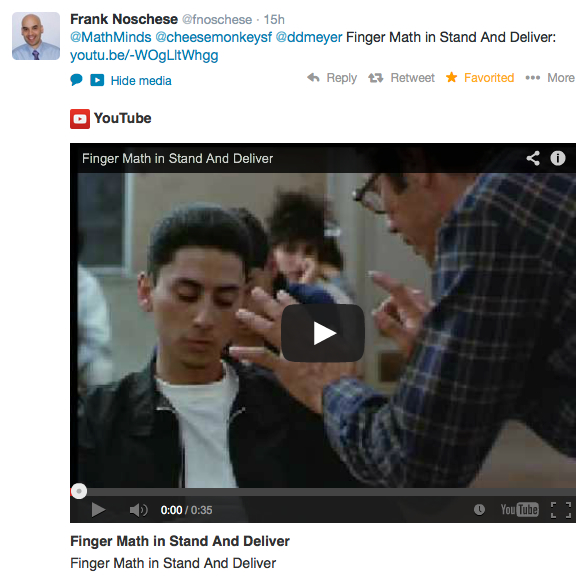
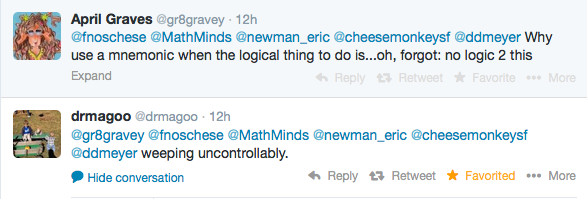

Nice.
At least my mnemonics actually work 😉
Dave
@reflectivemaths
LikeLike
I teach high school math in a unified district with two comprehensive high schools, two middle schools, and a bunch of elementary schools. They recently brought in a math consultant for the high school teachers for a one day training and he was so good it would have made you cry…. His focus was on the conceptual understanding to understand procedures… That things like all these mnemonics to learn math that don’t actually further understanding of math don’t belong in the classroom…. And he said this in front of our district people and administrators… The district is paying to have this guy come in and work with all teachers who teach math…. All the way down to kindergarten… Which made us high school teachers cheer causeour students come to us singing some crazy songs to remember everything from dividing fractions to factoring trinomials.
So what I’m wandering is… How much actual training and resources are going into helping everyone transition to common core? Even with our one day with this amazing guy, much of the things our department is doing to change curriculum and teaching is self driven and researched…. And we feel like we have no idea if what we are doing is heading in the right direction. Our district pacing guide (now aligned to common core standards) for the rest of the year says “teacher created resources” for each day cause there isn’t anything in our textbooks or even the common core workbooks we have.
LikeLike
Thanks for the comment Claire! I can completely relate to wanting to cry when we have amazing professional development that is centered around conceptual understanding and student reasoning. As far as our transition to CC, I don’t think our focus has been so much about materials and resources but more about putting more of a focus on what math should look and sound like in our elementary school classrooms. Are students exhibiting the Mathematical Practices? Are students grappling with the mathematics? At the elementary level, we use the Investigations program which, I feel, is very strong in promoting student reasoning.
The biggest problem I see (and hear in your comment as well) is having a math vision. Districts must have a vision of where the professional development is heading that is in line with the heart of the CCSS Math Practices and content standards. It is a tough road to get everyone on the same page, but the first steps will be these valuable, professional conversations.
Thanks,
Kristin
LikeLike
Pingback: The Fundamental Theorem of Calculus | Overthinking my teaching
Reblogged this on @ THE CHALK FACE and commented:
In case you don’t realize how insane things can get when people who know nothing about conceptual understanding of mathematics get their hands on things. . .
LikeLike
Pingback: #WhatCouldGoWrong | Educational Policy Information